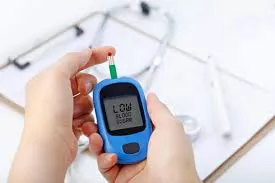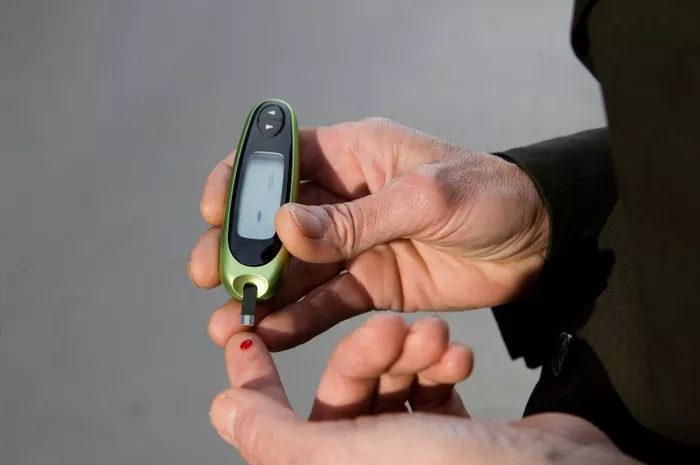High blood sugar levels, also known as hyperglycemia, are a critical concern for individuals with diabetes. Understanding what causes blood sugar to rise is essential for effective management and prevention of complications associated with this chronic condition. In this article, we will explore the various factors that can lead to elevated blood sugar levels, providing a detailed and professional overview for healthcare professionals, patients, and anyone interested in the intricacies of diabetes management.
Physiological Mechanisms of Blood Sugar Regulation
The human body maintains blood glucose levels within a narrow range through a complex interplay of hormonal regulation and metabolic processes. The primary hormones involved are insulin and glucagon, produced by the pancreas. Insulin lowers blood glucose levels by facilitating the uptake of glucose into cells, while glucagon raises blood glucose levels by stimulating the release of glucose from the liver. In individuals with diabetes, this balance is disrupted, leading to chronic hyperglycemia.
Types of Diabetes and Their Impact on Blood Sugar Levels
There are several types of diabetes, each with distinct mechanisms affecting blood sugar levels:
Type 1 Diabetes: An autoimmune condition where the body attacks and destroys insulin-producing beta cells in the pancreas. This leads to a complete lack of insulin, causing blood glucose levels to rise.
Type 2 Diabetes: Characterized by insulin resistance, where the body’s cells do not respond effectively to insulin. This is often coupled with an eventual decline in insulin production.
Gestational Diabetes: Occurs during pregnancy when hormonal changes cause insulin resistance.
Other Forms: Including monogenic diabetes and secondary diabetes due to conditions such as pancreatitis or use of certain medications.
Each type presents unique challenges in blood sugar management, requiring tailored approaches for effective control.
Dietary Factors Influencing Blood Sugar Levels
Carbohydrate Intake: Carbohydrates have the most significant impact on blood sugar levels. When consumed, carbohydrates are broken down into glucose, leading to an increase in blood sugar. The glycemic index (GI) of foods can influence the rate at which glucose is released into the bloodstream. High-GI foods cause rapid spikes in blood sugar, while low-GI foods result in a slower, more gradual increase.
Portion Sizes: Larger portions of carbohydrate-rich foods lead to higher blood glucose spikes. Managing portion sizes is crucial for maintaining stable blood sugar levels.
Timing of Meals: The timing and frequency of meals can also affect blood sugar levels. Irregular eating patterns or skipping meals can lead to fluctuations in blood glucose.
Balanced Diet: Including fiber, protein, and healthy fats in meals can slow down the absorption of glucose, leading to more stable blood sugar levels. For instance, fiber slows digestion, protein promotes satiety, and fats have a minimal direct impact on blood glucose.
Physical Activity and Its Effects on Blood Sugar
Exercise: Physical activity generally lowers blood sugar levels by increasing insulin sensitivity and promoting glucose uptake by muscles. However, the type, duration, and intensity of exercise can influence blood glucose in different ways. For instance, aerobic exercise tends to lower blood glucose more consistently, while high-intensity or anaerobic exercises may cause temporary spikes due to the release of stress hormones.
Activity Timing: The timing of exercise in relation to meals and insulin administration can affect blood glucose control. Exercising soon after a meal may help prevent postprandial spikes, whereas exercising on an empty stomach might lead to hypoglycemia.
Medications and Their Impact on Blood Sugar
Insulin Therapy: For individuals with Type 1 diabetes and some with Type 2 diabetes, insulin therapy is essential for managing blood glucose levels. The type (rapid-acting, short-acting, intermediate-acting, and long-acting) and timing of insulin injections can significantly affect blood sugar levels.
Oral Medications: Several oral medications are used to manage Type 2 diabetes, including metformin, sulfonylureas, and DPP-4 inhibitors. Each works through different mechanisms, such as increasing insulin sensitivity, stimulating insulin secretion, or slowing carbohydrate absorption.
Other Medications: Non-diabetic medications, such as corticosteroids, certain antipsychotics, and some antihypertensives, can raise blood sugar levels. It’s crucial for patients and healthcare providers to monitor and adjust diabetes management plans accordingly when such medications are prescribed.
Stress and Its Influence on Blood Sugar Levels
Physiological Stress: Physical stress, such as illness, surgery, or injury, can cause an increase in blood glucose levels due to the release of stress hormones like cortisol and adrenaline. These hormones trigger the liver to release glucose, leading to higher blood sugar levels.
Emotional Stress: Psychological stress can also impact blood sugar levels. The body’s response to stress involves the release of cortisol, which can lead to increased blood glucose. Chronic stress can make diabetes management more challenging by disrupting daily routines and affecting self-care practices.
Hormonal Changes and Blood Sugar Fluctuations
Menstrual Cycle: Hormonal changes during the menstrual cycle can affect blood sugar levels. Many women experience higher blood sugar levels in the luteal phase (post-ovulation) due to increased progesterone, which can cause insulin resistance.
Pregnancy: Hormonal shifts during pregnancy can lead to insulin resistance, especially in the second and third trimesters. This can result in gestational diabetes, which requires careful monitoring and management to protect both the mother and the baby.
Menopause: The transition to menopause can affect blood sugar levels due to fluctuating estrogen and progesterone levels. These hormonal changes can impact insulin sensitivity and lead to increased blood sugar variability.
Illness and Infections
Acute Illness: Common illnesses such as the flu or a cold can raise blood sugar levels due to the body’s stress response. Fever, dehydration, and reduced appetite during illness can further complicate blood sugar management.
Chronic Conditions: Conditions such as chronic kidney disease and liver disease can impair glucose metabolism and insulin clearance, leading to elevated blood sugar levels.
Infections: Bacterial or viral infections can trigger an immune response that increases blood glucose. For instance, urinary tract infections or dental infections are common culprits in raising blood sugar levels.
Dehydration and Blood Sugar Levels
Dehydration can lead to higher blood sugar levels due to the reduced volume of blood plasma. This concentration effect means that glucose becomes more concentrated in the blood. Additionally, dehydration can impair the kidneys’ ability to excrete glucose, exacerbating hyperglycemia.
Alcohol Consumption
Moderation: Alcohol can have varying effects on blood sugar levels. In moderation, particularly when consumed with food, alcohol may not cause significant blood sugar fluctuations. However, excessive alcohol consumption can lead to both hyperglycemia and hypoglycemia.
Hypoglycemia Risk: Alcohol can inhibit gluconeogenesis, the process by which the liver produces glucose. This inhibition can lead to low blood sugar levels, particularly several hours after drinking.
Sleep Patterns and Blood Sugar Control
Sleep Deprivation: Lack of sleep can adversely affect blood sugar levels. Poor sleep can lead to insulin resistance and increased appetite, particularly for carbohydrate-rich foods.
Sleep Apnea: Conditions like sleep apnea are associated with higher risks of developing Type 2 diabetes and can lead to poor blood sugar control in those already diagnosed with diabetes.
Environmental Factors
Temperature Extremes: Extreme heat or cold can affect blood sugar levels. Heat can increase insulin absorption from subcutaneous tissue, potentially leading to hypoglycemia. Cold can increase insulin resistance, causing higher blood sugar levels.
Altitude: High altitudes can affect blood sugar levels due to reduced oxygen availability, which can alter metabolism and insulin sensitivity.
Behavioral and Lifestyle Factors
Smoking: Tobacco use can increase blood sugar levels and insulin resistance. Nicotine stimulates the release of glucose and stress hormones, complicating blood sugar management.
Caffeine: Moderate caffeine consumption is generally safe for people with diabetes, but excessive intake can lead to increased blood sugar levels due to its stimulatory effects on adrenaline and other stress hormones.
Genetic Factors
Genetics play a significant role in an individual’s risk of developing diabetes and in how their body regulates blood sugar. Certain genetic mutations can cause monogenic forms of diabetes, and family history is a strong risk factor for both Type 1 and Type 2 diabetes.
Diabetes Complications and Blood Sugar Levels
Neuropathy: Diabetic neuropathy can affect the autonomic nervous system, which controls various bodily functions, including blood sugar regulation. This can lead to unpredictable blood sugar levels.
Gastroparesis: This condition, characterized by delayed stomach emptying, can cause erratic blood sugar levels. Food absorption is unpredictable, leading to both high and low blood sugar episodes.
Kidney Disease: Diabetic nephropathy can affect the kidneys’ ability to clear insulin from the bloodstream, potentially leading to higher blood insulin levels and lower blood sugar.
See also: What Is A Normal Glucose Test Result
Conclusion
Understanding the multifaceted causes of high blood sugar levels is crucial for effective diabetes management. By recognizing the diverse factors that influence blood glucose, healthcare providers can better tailor treatment plans to individual needs, and patients can gain greater control over their condition. From physiological mechanisms and dietary habits to stress and environmental influences, each element plays a role in the complex landscape of blood sugar regulation. Ongoing education, personalized care, and vigilant monitoring are essential to manage diabetes effectively and improve quality of life for those affected by this chronic condition.
Related topics:
What Is The Range For Hemoglobin A1c

























